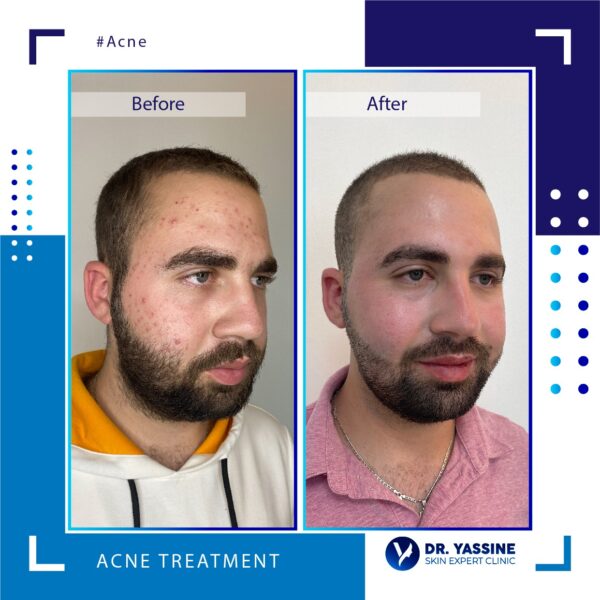1. What causes acne?
Acne is a result of a clog in a skin pore, in which dead cells stick together instead of rising to its surface. Sometimes, bacteria that live in our skin, Propionibacterium acnes, get inside this pore causing it to become inflamed, red, and swollen.
2. Can certain food cause acne?
Some studies suggest that choosing low-glycemic food (like fresh vegetables and fruits, beans, and steel-cut oats) instead of high-glycemic (such as white bread, fries, and pastries) may reduce your acne since these foods raise your blood sugar quickly. Also, avoid cow milk since researches have linked it to acne.
If you believe your diet is affecting your acne, Dr. Yassine recommends you to pay attention to your breakouts and check if any food or beverage seems to worsen your acne and what happens when you don’t consume it for a certain time.
3. Why should we treat acne as the earliest possible?
Unlike what many believe, letting acne run its course is not the best option. Prefer to treat your acne as soon as possible because it improves your self-esteem and without treatment, acne may leave dark spots and scars in your skin.
4. When to see a dermatologist?
If you have a lot of acne, you should see a dermatologist who will prescribe you the right treatment. Most of these treatments are topical, that is, applied to the skin and they work on killing bacteria or reducing the oil. Your dermatologist will better define what suits you.
5. How to get rid of acne?
Other than the typical treatment that works throughout the body, like antibiotics, birth control pills, and isotretinoin, Dr. Yassine also performs effective procedures on healing acne:
- Lasers and other light therapies: that reduce the P. acnes bacteria.
- Chemical peels: Used to treat two types of acne—blackheads, and papules.
- Acne removal: Dr. Yassine may perform a procedure called “drainage and extraction” to remove a large acne cyst when it doesn’t respond to medicine. It also helps ease the pain and the chance that the cyst will leave a scar.
Our dermatologist, Dr. Yassine, recommends that people treat acne and continue their treatments even when the skin clears. Dr. Yassine can tell you when to stop it to prevent breakouts.
Here are some tips for reducing your acne:
- Wash at least twice a day and after sweating.
- Apply non-abrasive cleanser using your fingertips.
- Use gentle products, such as the ones that are alcohol-free. Avoid the products that irritate your skin, which may be astringents, toners, and exfoliants.
- Avoid scrubbing your skin.
- Rinse with lukewarm water.
- Shampoo on regular basis.
- Don’t pick, pop, or squeeze your acne.
- Avoid touching your face.
- Avoid the sun and tanning beds.
- Remove your makeup before going to bed.
- Clean your makeup brushes weekly and don’t share them.
- Use oil-free, “won’t clog pores”, or non-comedogenic products.
At Skin Expert Clinic, Dr. Yassine will provide you with the right treatment to boost your skin and self-esteem. Visit us for the best outcomes!

